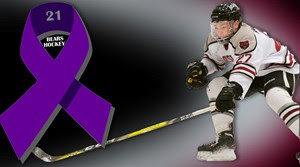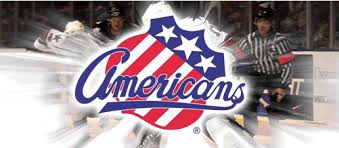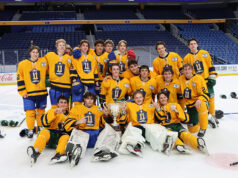Sean Kacerosky arrived at SUNY Potsdam in the fall of 2014 to earn a degree in Biology and play NCAA ice hockey. During his first season with the Bears the Kendall Park, N.J. native played in just four games. The limited playing time didn’t deter him as he had already dealt with other obstacles that would have stopped other players from reaching this point.
Kacerosky learned he had diabetes on Dec. 12, 1997, when he was just four years old. From that point on he learned to get used to hospitals, needles and constantly monitoring his body. Learning to balance the disease and living life is challenging, but certainly manageable with increasing knowledge and improving technology. It’s more challenging, but certainly not impossible, to play hockey with diabetes. Hall of Famer and two-time Stanley Cup Champion Bobby Clarke played 15 seasons and recorded over 1200 points in the NHL, while handling the disease. With all these things in mind, Kacerosky continued to advance to higher levels of organized hockey.
He played in 19 games with the Philadelphia Jr. Flyers of the Atlantic Jr. Hockey League during the 2012-13 season. The following year he had a breakout campaign with the New York Bobcats of the Eastern Hockey League, scoring 12 goals and assisting on 15 others for 27 points. The performance caught the attention of college teams including the Bears and he was in a Potsdam jersey the next season.
Kacerosky entered his sophomore year as part of a young defensive corps with some gaps to fill due to the graduation of key veterans. He and his teammates responded. The Bears started 2015-16 red hot and earned a national ranking for the first time in 15 seasons en route to their fourth playoff appearance in the previous five years. When the dust settled, Kacerosky had played in all 26 games and collected two goals and three assists for five points. Potsdam’s defense gave up just 79 goals in 1582 minutes, the fewest in the program’s 40 seasons.
After wrapping up the year, Kacerosky was focused finishing out the semester strong academically and preparing for his junior season. On April 19, an unseasonably warm day in the North Country, Kacerosky was at the beach with some friends.
“I wore a bathing suit with a liner in it,” said Kacerosky. “There were some dull pains. I went home, checked and it didn’t feel quite right so I went to student services the next day and they sent me to get an ultrasound.”
He returned to class after the ultrasound, before another stop at health services for the results.
“They said sit down,” said Kacerosky. “I was thinking it was something bad if they’re telling me to sit down. They said I had testicular cancer and that I had to go see a pathologist.”
The news was certainly unsettling for Kacerosky, but he felt his past medical history helped him handle it better than many would have.
“I Immediately I thought, ‘how do I beat it,’ because when you hear the c-word, you kind of get the feeling that this is it,” Kacerosky said. “I was diabetic already on top of that, so getting bad news is something I’ve had happen before in my life. I didn’t have the attitude that I’m going to give up. I thought, how do I make it work.”
A pathologist spoke to Kacerosky and wanted to send him to surgery that night. Since things were moving so fast, it took some time for his parents to travel from New Jersey. Fortunately, Kacerosky had another group of supporters close by.
“The first people I actually told were my teammates,” Kacerosky said. “They all left class to come and see me before surgery. It’s easy to have a good mindset when you have 26 people that are always there for you no matter what.”
Just over a day had passed from when Kacerosky noticed the pain and to going into surgery. Fortunately, they caught the cancer early.
“They had the tumor sent to the lab,” said Kacerosky. “They did a test on my blood which tests your alpha-beta proteins. They checked the markers. Lance Armstrong had the same type of cancer and when he got tested, his was like in the millions. It was very, very bad, like stage 4. Mine was about 40, so it hadn’t spread very far in my body.”
Since his markers were so low, Kacerosky didn’t require any further treatment other than a minor follow up surgery. He just goes in for a CAT scan every two months. Kacerosky has had three since the surgery and is still in remission. When all was said and done, Kacerosky only missed one day of classes due to the scary situation.
“It took a little while to heal,” Kacerosky said. “I couldn’t go up the stairs for two weeks. They didn’t want the stitches to pop out. So after that I just went back to my normal stuff like lifting weights, skating every day. August is when we all come back to school and start skating so I had to take it slow for a little bit, but thankfully I didn’t miss too much. Typical hockey player, two weeks and I was doing stupid stuff.”
After a little bit of recovery time he was healthy and ready to start his junior season. Just over a minute into the second game of the year, Kacerosky recorded his first assist. Less than minute later, he was on the receiving end of a slash that broke his right index finger. The injury cost him six games. He had pins placed in the finger, making it three surgeries in four months. Again, he was only slowed down and is back in the lineup.
While he realizes how serious his brush with cancer is, he doesn’t consider it the toughest obstacle he’s had to deal with.
“It’s kind of easier (to deal with than diabetes) in a way because it was only one day and thankfully I didn’t have to go through chemotherapy or radiation,” said Kacerosky. “So I didn’t have to handle that aspect of it. Diabetes is every day.”
He is currently beating both diseases and is pleased to be a part of a program that his holding its DHC Night for the Fight Against Cancer this Saturday.
“I think it’s a very good thing for people to be aware of,” Kacerosky said. “With November just ending, the month for male awareness and male health issues, I think it’s awesome that we’re doing something like that and helping to raise some money for cancer research.”
On Saturday night, the Bears will wear special purple jerseys during their game against Geneseo in support of the fight against cancer. A ceremonial puck drop will open the contest. A donation table and remembrance poster will be available for contributions and acknowledgements. All proceeds from the night will go to the American Cancer Society.
While Kacerosky admits his luck, he also has the mindset of a fighter. That will continue to serve him, whether on the blue line for the Bears or in any other aspect of his life.






